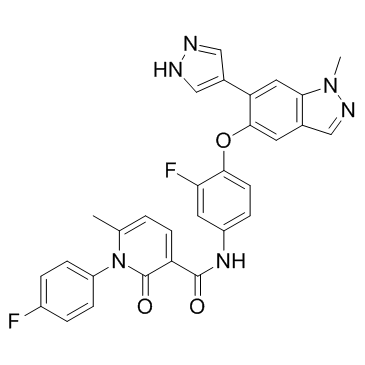1206799-15-6
| Name | N-[3-fluoro-4-[1-methyl-6-(1H-pyrazol-4-yl)indazol-5-yl]oxyphenyl]-1-(4-fluorophenyl)-6-methyl-2-oxopyridine-3-carboxamide |
|---|---|
| Synonyms |
LY-2801653
L1X UNII:5OGS5K699E N-(3-fluoro-4-((1-methyl-6-(1H-pyrazol-4-yl)-1H-indazol-5-yl)oxy)phenyl)-1-(4-fluorophenyl)-6-methyl-2-oxo-1,2-dihydropyridine-3-carboxamide N-(3-Fluoro-4-{[1-methyl-6-(1H-pyrazol-4-yl)-1H-indazol-5-yl]oxy}phenyl)-1-(4-fluorophenyl)-6-methyl-2-oxo-1,2-dihydro-3-pyridinecarboxamide merestinib LY2801653 QCR-139 |
| Description | Merestinib (LY2801653) is a type-II ATP competitive, slow-off inhibitor of MET tyrosine kinase with a dissociation constant (Ki) of 2 nM. |
|---|---|
| Related Catalog | |
| Target |
Ki: 2 nM (c-Met)[1] |
| In Vitro | Merestinib (LY2801653) demonstrates effects on MET pathway-dependent cell scattering and cell proliferation. The mean IC50 value (n=6 determinations) of Merestinib (LY2801653) for inhibition of MET auto-phosphorylation in HGF-stimulated H460 cells is 35.2±6.9 nM and the IC50 for MET auto-phosphorylation in S114 cells is 59.2 nM. Transfection with the MET variants confers growth-factor independence and treatment with Merestinib (LY2801653) inhibits growth of these MET variant clones with an IC50 ranging from 3-fold more potent (V1092I) to approximately 6-fold less potent (L1195V) compare with the growth inhibition of cells with the MET wild-type sequence[1]. Merestinib (LY2801653) (2, 5, and 10 μM) reduces the number of viable TFK-1 and SZ-1 cells in a dose and time dependent manner, and significant inhibits wound healing for TFK-1 and SZ-1 cell lines. Merestinib (LY2801653) inhibits cell invasion in TFK-1 and SZ-1 cells in a concentration dependent manner[2]. |
| In Vivo | Merestinib (LY2801653) demonstrates anti-tumor effects in MET amplified (MKN45), MET autocrine (U-87MG, and KP4) and MET over-expressed (H441) xenograft models; and in vivo vessel normalization effects. Merestinib (LY2801653) is a type-II ATP competitive, slow-off inhibitor of MET tyrosine kinase with a pharmacodynamic residence time (Koff) of 0.00132 min-1 and t1/2 of 525 min. Merestinib (LY2801653) treatment inhibits MET phosphorylation with a composite TED50 (50 % target inhibition dose) of 1.2 mg/kg and a composite TED90 (90 % target inhibition dose) of 7.4 mg/kg[1]. Merestinib (LY2801653) (20 mg/kg) reduces TFK-1 tumor growth significantly relative to vehicle control. Merestinib (LY2801653) inhibits the growth of intra- and extrahepatic CCC xenograft tumors[2]. |
| Cell Assay | H460 cells are cultured in RPMI media supplemented with 10% FBS and plated (prior to becoming 70% confluent) in 96-well plates at 20,000 cells/well and are incubated overnight at 37°C. The next day, the cells are incubated with RPMI-1640 in low serum (0.5% FBS) for 2 hours prior to treatment with Merestinib (LY2801653). Thirty minutes after the addition of Merestinib (LY2801653), HGF at a final concentration of 100ng/mL is added. After a 10-minute incubation, cell lysates are prepared and pMET is quantified. Relative IC50 values are determined using MSD activity units by calculating the percentage of inhibition with respect to on-plate MIN (unstimulated) and MAX controls and then fitting the percentage-of-inhibition values and 10-point dose response data to a 4-parameter logistic equation using ActivityBase[1]. |
| Animal Admin | Mice[1] S114 cells are implanted subcutaneously onto female athymic nude mice. For dose response evaluation, on day 8 after the implantation, Merestinib is given at a range of 0.75 mg/kg to 100 mg/kg (n=8 per dose group). At 2 hours after dose, blood samples and tumors are collected and flash frozen. For time course study, Merestinib is given at 12 mg/kg (n=10 per time point). Animals are sacrificed at 2, 8, 16, and 24 hours after dose, and blood samples and tumors are collected. pMET is measured in the S114 tumor lysates using the MSD ELISA assay. Lysates are prepared from pulverized frozen tumor tissue, and homogenized with Lysing Matrix D beads, with addition of RIPA lysis buffer containing phosphatase and protease inhibitors. Protein concentration is determined using the DC protein assay kit. The pMET MSD ELISA assay is performed. |
| References |
| Density | 1.4±0.1 g/cm3 |
|---|---|
| Boiling Point | 795.3±60.0 °C at 760 mmHg |
| Molecular Formula | C30H22F2N6O3 |
| Molecular Weight | 552.531 |
| Flash Point | 434.8±32.9 °C |
| Exact Mass | 552.172119 |
| PSA | 106.83000 |
| LogP | 5.21 |
| Vapour Pressure | 0.0±2.8 mmHg at 25°C |
| Index of Refraction | 1.686 |
| Storage condition | -20℃ |
| Hazard Codes | N |
|---|
